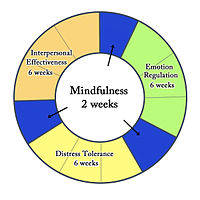
Photo from wikipedia
Abstract Background Providing professional support for people with mild to borderline intellectual disabilities (IDs) is supposed to support their autonomous participation in society and, in turn, enhance their well‐being and… Click to show full abstract
Abstract Background Providing professional support for people with mild to borderline intellectual disabilities (IDs) is supposed to support their autonomous participation in society and, in turn, enhance their well‐being and quality of life. However, the motivation for seeking support may differ for people with mild to borderline IDs, varying in the extent to which the person's autonomy is self‐determined. The present study tested the association between different types of motivation for seeking support and well‐being. Method Adults with mild to borderline IDs (N = 154) participated in a cross‐sectional survey. Researchers administered the Self‐Regulation Questionnaire – Support – II (SRQ‐S‐II) and a life satisfaction questionnaire. To determine the test–retest reliability of the SRQ‐S‐II, 30 participants completed a follow‐up questionnaire. Results The motivations cited by people with mild to borderline IDs for seeking support ranged from amotivation to intrinsic motivation. Multiple regression analysis indicated that the model explained 56.6% of the variance, with intrinsic motivation (β = 0.361, P < 0.001) and identified motivation (β = 0.381, P = 0.001) proving to be significant predictors in terms of explaining the highest percentage of variance in well‐being. Amotivation (β = −0.247, P = 0.004) and introjected motivation (β = −0.145, P = 0.03) contributed significantly to the model with negative beta coefficients. Finally, reliability measures (Cronbach's alphas, MacDonald's omegas and test–retest reliabilities) indicated that all types of motivation for seeking support could be reliably assessed. Conclusions The results of the present study showed that people with mild to borderline IDs displayed the full range of types of motivations for seeking support and, moreover, that it was associated with well‐being. Studying these motivational states, and increasing our awareness of what motivates this population to seek support, can aid the design of more effective support that respects self‐determination and well‐being. The SRQ‐S‐II is thus an important instrument for understanding the role of support in promoting well‐being.
Journal Title: Journal of Intellectual Disability Research
Year Published: 2021
Link to full text (if available)
Share on Social Media: Sign Up to like & get
recommendations!